Abstract
The approach in students’ assessment is and has to be considered one of the most important elements in the entire university educational process. The results that they achieve have a fundamental effect on the development and acquisition of some skills that are necessary in their future careers. The purpose of our research is to investigate some of the most important elements of assessment as seen by students before the exam session. The method of investigating the matter of assessment is the survey, conducted using the questionnaire as a tool. The sample of subjects consists of three hundred and sixty students from the University "1 Decembrie 1918" in Alba Iulia, second year of study. Among the indicators presented in the questionnaire we find: the forms of examination, the way in which the students rate the examination during the semester, what content should the exam tasks have, to what extent did the exam tasks require them to think logically, what expectations they have on the requirement of an exam, how important collaboration with other colleagues is in preparing and taking an exam and others. The conclusions are elaborated based on the statistical analysis and confirm the presence of some unique elements: the diversification of the assessment strategies, the importance of collaboration before taking an exam, respectively aspects regarding the forms of assessment.
Keywords: Academic assessment, exams session, students
Introduction
In the specialized literature the field of evaluation permiates the multitude of levels and contexts of the educational and training structure through which: te assessment of scientific research is carried out, practices are examined, inspections are carried out, discussions are prepared as well as methodological guidelines on evaluation and various reports. All of these issues are accompanied by questions about the direction of the evaluative intervention. Many specialists make various observations about the credibility, authenticity and social value of the results obtained from the evaluation process (Figari & Lopez, 2012).
Assessment is the complex act of collecting a set of relevant, valid and reliable information about the relevance and value of processes, performance, skills, educational or didactic behavior and examination of the adequacy between this set of information and a set of criteria established in accordance with the objectives pursued and fixed in advance. Evaluation involves the implementation of evaluative processes, is carried out in accordance with specific evaluative strategies and by means of appropriate methods, techniques and tools (Bocoș, 2016, p. 127).
Evaluation includes the activities carried out by the teacher and/or their students by presenting the information that can then be used in modifying the activities involving the teaching process, respectively the learning process (Black & Wiliam, 1998).
Evaluation has a qualitative aspect, but also a quantitative one by which one can observe the variety of the entire evaluation action which involves both a qualitative assessment and a measurement in order to make decisions (Roman, 2014).
Evaluation is designed for obtaining better decisions, gives the utmost importance to the development of value judgments and at the same time gives a significant role to the educational function of the evaluation (Țeican, 2019).
Problem Statement
Student assessment should be regarded as one of the most important elements in the entire university educational process. The results obtained by the students have effects on their development and on the acquisition of certain skills, skills that are necessary for their future career and also for the active integration into social life.
The study includes a series of information referring to the length of the exam session collected from students. This information relates to the forms of examination, how they judge the examination during the semester, what content the exam subjects should have, to what extent did the exam subjects request their logical thinking, what expectations they have about the demands of an exam, how important it is to work with other colleagues in preparing and taking an exam.
Research Questions
The questions of this research raised the following aspects: the forms of examination suitable for the field that each student follows; the forms of examination used so far in the field they follow; how students judge the examination during the semester; what should be included in the subjects of the oral, written and multiple choice exams; to what extent did the subjects of the exam require their logical thinking up to this point; what are the students’ expectations regarding the requirement of an exam; how important it is to collaborate with other colleagues in preparing for an exam; how important it is to collaborate with other colleagues in taking an exam; what are the situations that benefit students the most during an exam; how do they judge the idea of certain professors about proposing exams with all the sources of information at hand and which also include requirements that involve logical thinking.
Purpose of the Study
The purpose of our research is to investigate some of the most important elements related to assessment as seen by students before the exam session.
Research Methods
During our research, the method of investigating the matter of evaluation was the survey method, conducted using the questionnaire as a tool (Bhandari, 2021).
Findings
The sample included three hundred and sixty students from “1 Decembrie 1918” University of Alba Iulia, the second year of study, and after the research we were able to identify the following results.
The first question of the questionnaire refers to the appropriate examination forms for the field that each student follows (figure 1). As we can see, 38% of students prefer the essay or practical work prepared before the exam, 28% prefer the written paper during the exam, 26% of students prefer the multiple choice exam, and 8% of them opt for the oral exam.
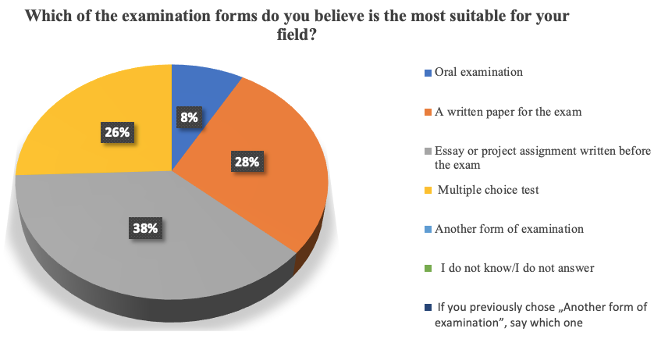
The second question brings into question the forms of examination that have been used so far in the specialization that the student is pursuing (figure 2). The results here were as follows: 60% of students chose as a variant the written paper during the exam, 17% essay or practical work prepared before the exam, 12% multiple choice test, and 11% chose the oral exam.
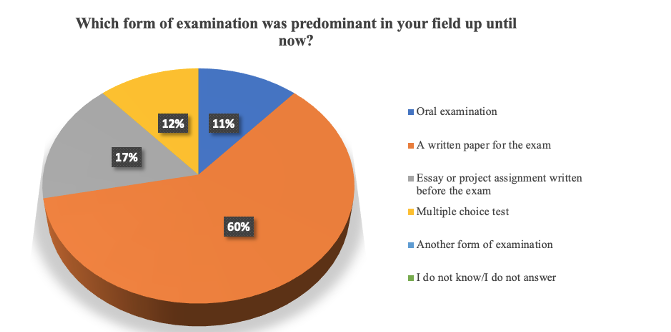
The third question discusses the way in which students judge the examination during the semester (figure 3). Here the results were as follows: 64% responded that it was needed in all disciplines, 24% that it was only required in the case of the more difficult disciplines, and 12% replied that it was not necessary.
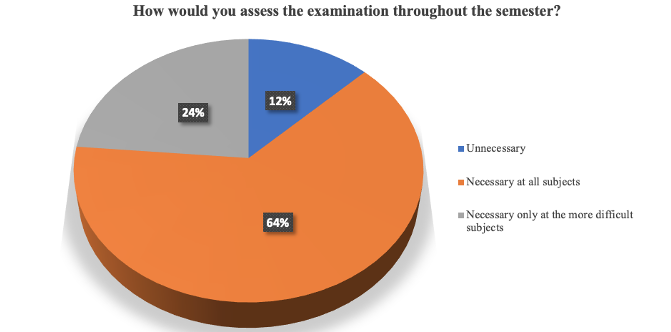
To the fourth question, about which subjects should be included in oral, written and in the form of a multiple choice test (figure 4), 84% of the students replied that a selection of the taught material should be included, 14% the entire taught material, and 2% went for all taught material and the bibliography.
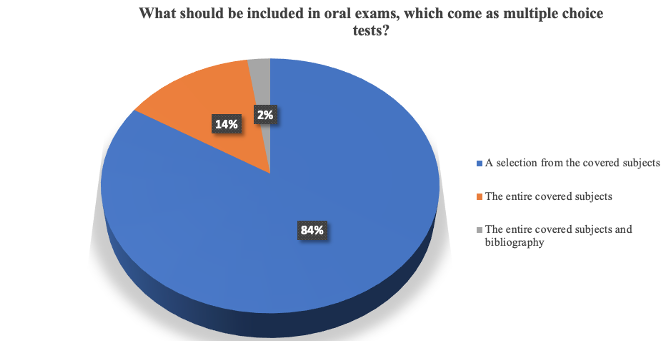
The fifth question refers to how much logical thinking was required in the course of solving the exam subjects (figure 5). Here the percentages were as follows: 74% chose the answer option to a large extent, 20% to a small extent, and for 6% of the students the answer offered was that they were never asked for logical thinking, they just reproduced the information they had learned.
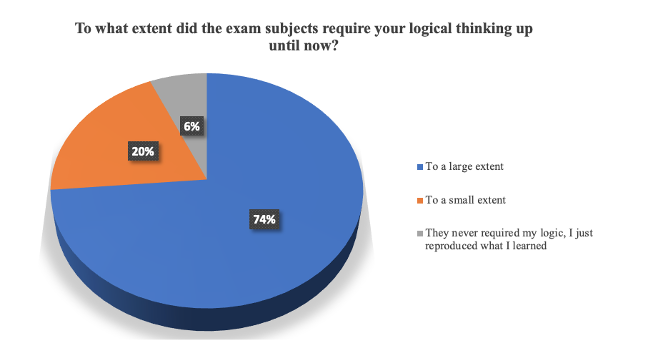
The sixth question refers to the expectations students have about the requirement of an exam (figure 6). Here the results are as follows: 59% of students expect less demand from teachers, 34% expect maximum demand, and 7% expect maximum leniency.
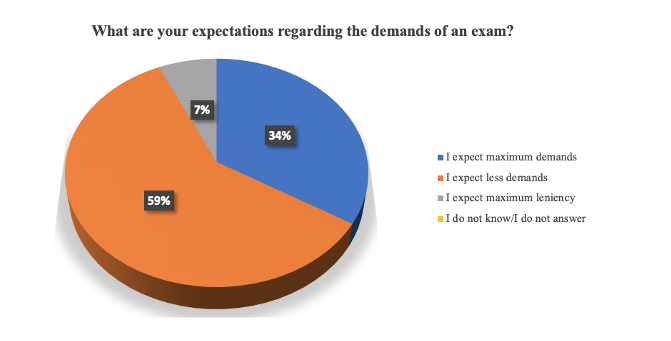
In question seven, we brought to discussion how important it is to work with other colleagues in the preparation of an exam (figure 7). The results were as follows: 66% of students said it was very important, 32% said it was less important, and 2% of them chose as a response that it was not important at all.
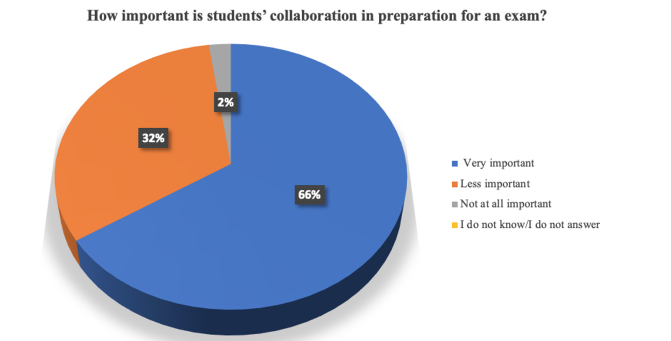
The eighth question presents how important it is to work with other colleagues in taking an exam (figure 8). Here there is a tie for two of the answer options, 39% of the students said it was very important and the same percentage came out in another variant that said it was less important. 22% of students said that this collaboration is not important at all.
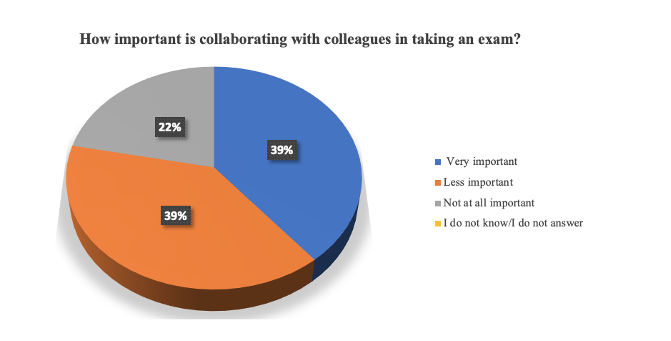
The penultimate question concerned the situations that students think benefit them the most in an exam (figure 9). Here the answers were varied and the following proportions resulted: 65% opted to retain the main ideas that will be developed in the exam, 21% opted for an essay or a practical work, 9% opted for an essay or a practical work together with other colleagues, 4% opted for memorizing the answers to a multiple choice test, and 1% opted for memorizing and reproducing word for word the information they learned.
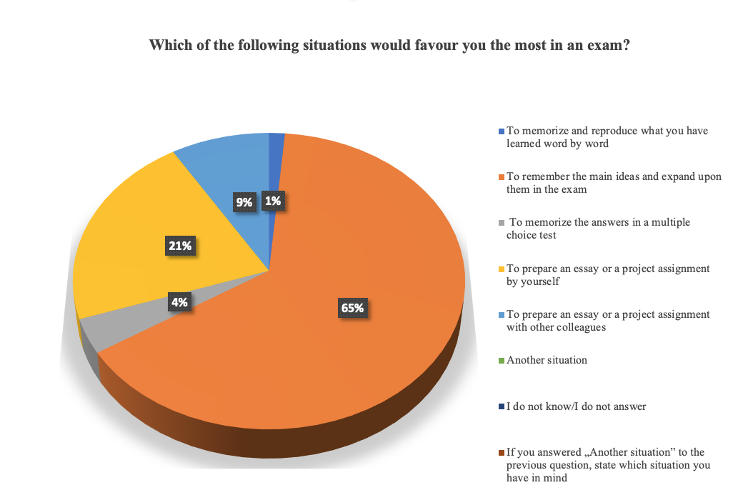
The last question concerns how students assess the idea of teachers proposing exams in which students can use all sources of information and which include requirements for solving tasks with the involvement of logical thinking (figure 10). The percentages for this last question are: 82% of students said it was a very good idea, 13% said it was a less good idea, 3% hesitated to give us a clear answer, and 2% said it was an inappropriate idea.
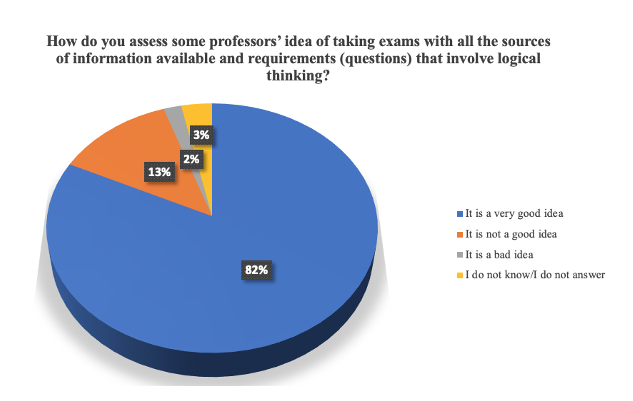
Conclusion
The conclusions are drawn based on a statistic analysis and confirm the presence of some unique elements.
We were able to observe in the research that I conducted interesting aspects regarding the period of the studentsʼ exam session. We have found that it is important to take into account the diversification of assessment strategies, that students prefer a certain way of examination, especially the practical one, and that there is a way in which they want to conduct themselves a research on a particular topic, we have also been able to identify the forms of examination that our students have taken part in so far. Furthermore, we could understand what they would like to be covered by the subjects of their exams, if they are asked for their logical thinking within them, whether it is important to collaborate with other colleagues in the preparation and taking of an exam, and also what are the situations that benefit them during an exam.
References
Bhandari, P. (2021). Designing a questionnaire. Scribbr.
Black, P., & Wiliam, D. (1998). Assessment and Classroom Learning. Assessment in Education: Principles, Policy & Practice, 5(1), 7-74. DOI:
Bocoș, M. D. (Coord). (2016). Dicționar praxiologic de pedagogie [Praxiology Dictionary of Pedagogy] (2nd. Volume). Paralela 45 publishing house.
Figari, G., & Lopez, L. (2012). Modelisations de l”evaluation en education [Models of evaluation in education]. De Boeck Universite, Bruxeles.
Roman, A. (2014). Evaluarea competențelor.Perspective formative [The Evaluation of skills. Formative Perspectives]. Pro Universitaria publishing house.
Țeican, B. (2019). Studentul profesor. De la evaluare durabilă la competențe durabile [The Teacher Student. From Durable Evaluation to Durable Skills] Tritonic publishing house.
Copyright information

This work is licensed under a Creative Commons Attribution-NonCommercial-NoDerivatives 4.0 International License.
About this article
Publication Date
31 May 2023
Article Doi
eBook ISBN
978-1-80296-962-7
Publisher
European Publisher
Volume
6
Print ISBN (optional)
-
Edition Number
1st Edition
Pages
1-710
Subjects
Education, reflection, development
Cite this article as:
Felea, M. I., & Roman, A. F. (2023). Academic Assessment from the Studentsʼ Perspective. In I. Albulescu, & C. Stan (Eds.), Education, Reflection, Development - ERD 2022, vol 6. European Proceedings of Educational Sciences (pp. 542-549). European Publisher. https://doi.org/10.15405/epes.23056.49

